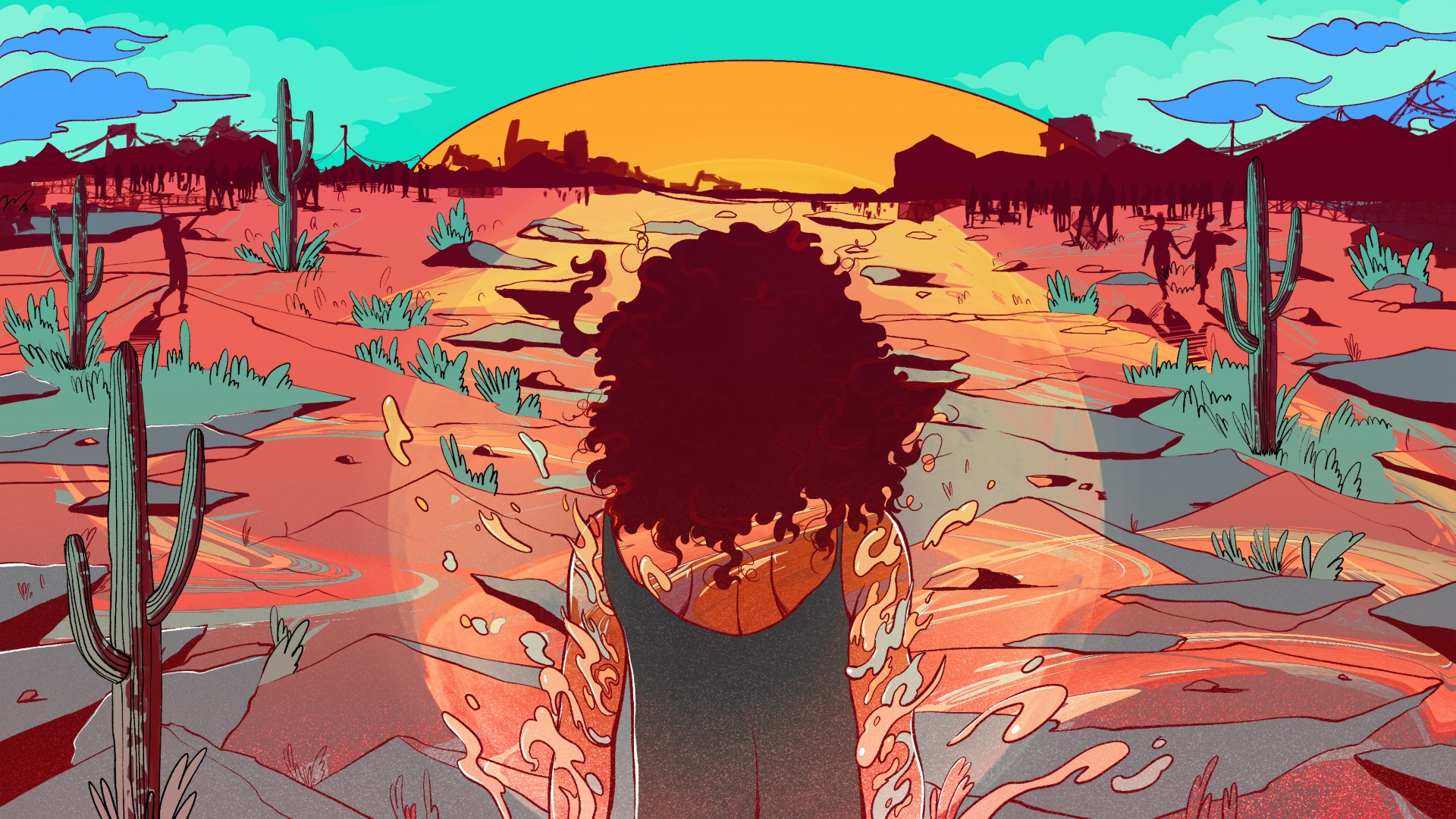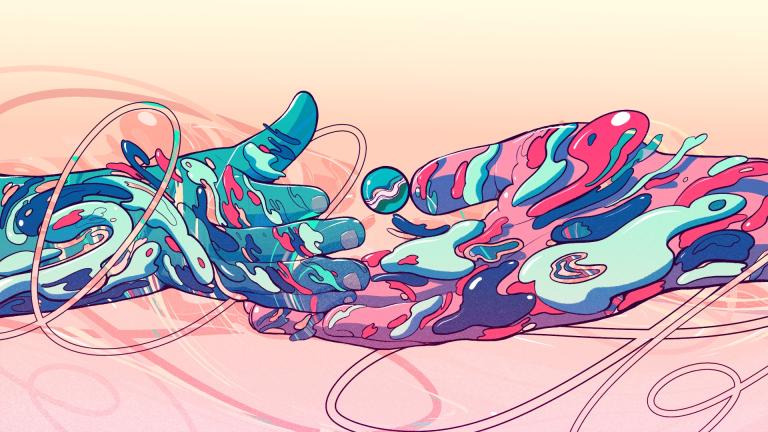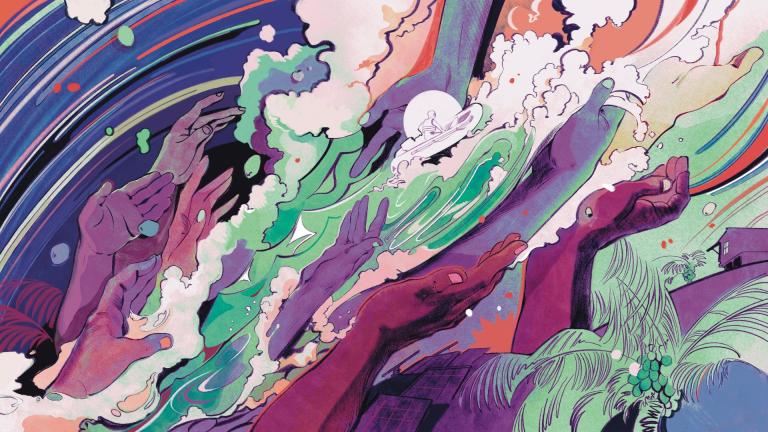Imagine 2200, Grist’s climate fiction contest, celebrates stories that offer vivid, hope-filled, diverse visions of climate progress. Discover all the 2024 winners. Or sign up for email updates to get new stories in your inbox.
My friends sent me their best wishes with hugs and honey-drenched sweets. My parents hovered anxiously as the droids walked them through their scientific methodology twice and then a third time just for good measure. They held my hands tightly until the lead droid politely informed them that the procedure could not actually proceed while they were present. I will be stuck in this muted, sterile clinic room by myself for the next few days.
“It will be uncomfortable,” says the lead droid, “but it will work.”
I nod and shiver. It puts a silicon palm on my forehead to calm me, though I realize later it was likely only taking my temperature. My room is gray and has a tall window cut into one side which frames the desert and her sky intersecting at purple mountains off in the distance. The droid sees me watching and smiles.
“Only a few more days,” it says as it attaches a few sensors to my arms and neck. It leaves me to get undressed.
It is one week until March, and my mother and father have almost finished packing up the house. Everything worth taking has been tied up in neat parcels and then loaded onto caravans the size of small houses. Outside, the tarps and colorful clothes that shade our streets have been folded away and tied over doors and windows to keep the dust out. The sun will bake the roads and blind those who leave the comfort of their homes in these last few days. The city will be resting and drinking in anticipation.
I remove my clothes and watch as sand and small rocks that have accumulated in my pockets tumble out and onto the clinic floor. I take my time shuffling the pile of dirt into a corner of the room with my feet. I run oil through my hair with a comb and plait it into four horns curling against my head. I wipe off the dust that seems to permanently reside in the creases of my elbows and on my eyebrows. On the days when my siblings and I come home from spending all day outside, my mother will call us her dust bunnies or her desert hares. My father will say we are walking geological monuments and will shoo us towards the bathroom.
There is a thick, white robe on my bed in which I wrap myself. It clings to my body with a comforting pressure. When the droid returns, it is holding a tray of disgusting-looking pills. It begins reciting origins. “The substance you are about to take contains spores nurtured in our city of Xayma by 16th-generation maroon descendants. It contains ground powder from an unnamed plant grown on land managed by the Tepoles sustained by six liters of irrigated water. Sugarcane grown in Onyx by the Guardian Collective …” The droid continues listing substances and their origins for what feels like another five minutes. I stare out the window, imagining the long journey some of these substances have taken, imagining the hands that wrested a living thing from the earth and the water condensing into raindrops to feed their growth. This is no small thing they’ve made for me.
The droid finishes its recitation with: “Do you honor this?” I nod. “Say it,” it commands. I’ve heard this query and response repeated so many times that the frequency of its use has diminished its meaning for me. Today, though, I need this to work.
“I honor this,” I say, willing as much reverence as I can into three words. The droid hands me the pills and I swallow them dry. It watches them slide down my throat and then ensures my robe is completely around me, covering my feet and pulling the hood over my head until I am fully swaddled. It takes one last glance towards my vitals before leaving me in my clean little room. I settle into my cocooning robe and wait anxiously for some sign that my body is changing.

Metamorphosis is somewhat of a superpower. Most of us believe that metamorphosis is the latest step in the long evolution of our ancestors’ survival. First there was the bitter perversion of biological discrimination, then the precision of oligarchy, and of course now, the rather poetic chaos of ecological feedback loops nudged too far in one direction. Always, we have survived, bobbing, weaving, and sometimes forcing our way into a brighter and more joyful existence.
For my family and the rest of my city, metamorphosis is an easy process. They take one pill a day for a week, and their metabolisms shift unnoticeably under sun-burnished skin. By the end of the week, they are ready for Road March. Without metamorphosis, the shadeless, water-scarce journey from desert to sea and back again would be almost impossible. With metamorphosis, for those few weeks of Road March, moisture becomes abundant, pulled out of dry air. Marathons of miles become leisurely, and the heat of the sun feels like velvet on skin. Our city transforms from a quiet splotch in the middle of a quieter desert into a loud line of traveling carnival for two weeks, and then once arrived, back into a quiet dot, this time by the sea. We sleep head to toe and breathe each other’s air. We paint our faces the color of jewels and smear blue, green, and yellow on brown skin. We hang gold metal from soft earlobes. Shells from our sea that have been carefully stored from our last return trip are retrieved from their wrapping and gently nestled into clouds and braided rows of our hair.
But the best is the music. Steel drums will sing out something that bubbles in my chest, while the bass will call to whatever beast is sleeping under our feet. Sometimes the rhythm teases our heels and toes as they graze the ground in time. Sometimes there will be only the bass of the drums between our footsteps and exhaustion. By the time we reach the sea, bodies will have faded back into homeostasis.
I cannot remember the last time I had this luxury. I had been just leaving my years of awkward self-consciousness and was finally learning how to catch a rhythm when my body decided to reject the drugs that were supposed to save us. As such, I have had the distinct pleasure of spending what should be a euphoric two-week journey in a state of severe dehydration and painful delirium. I stay stubbornly hot-blooded and water-dependent, while everyone else is dancing in the desert heat like little sun gods.
Outside, the sun is setting a violent orange, a warning of the impending dust storms spinning in our direction. Back at home, my father will be rising from his late afternoon nap to scrounge up something that will resemble dinner. My mother will be lounging on the couch with heavy eyelids and a cup of steaming tea. My siblings will be asleep until the fragrance of dinner calls them to the kitchen. It is a calm week. No hallucinogens, no wine, no liquor during metamorphosis week.
I do not remember falling asleep, but when I wake, my muscles are cramping painfully, and I am nauseous to the point of vomiting. My limbs are contorted against my body and I feel as though I am being slammed against something again and again. I twist around in my robe until I find an opening through which I can peek out. I scream, but no sound leaves my throat.
I have been thrown over the shoulder of a well-muscled human back the color of rich soil. Legs are striding across the ground at a quick pace.
“Hello?” I shriek, but my voice is caught in my throat. The head turns to look down at me to reveal a sculpted cheekbone and an onyx orb where an eye should be, and locks piled regally on a slender neck. I open my mouth to scream again and kick at her back in a panic. She is impossibly large for a human. I see her mouth curve up the cheekbone in a smirk as she shifts my weight so that my kicks no longer connect.
“Where are you taking me?” I gasp. This time my voice works.
She shrugs. They were doing it wrong. Her voice reverberates painfully. She hasn’t opened her mouth to speak, nor can I feel the vibration of air in her lungs.
To be fair, they did everything right. Sometimes you just need a little boost. She chuckles. The sky above her is shocking blue, and I can see a fragment of the mountain against which Xayma is nestled.
“Where are you taking me?” I ask again. “Put me down!”
No. You’re in the middle of a metamorphosis. The significance of this barely registers, as I am still panicking and attempting to twist myself out of my robe and onto the ground. Hush now. I don’t want to drop you.
I realize we have been walking across the roof of the clinic, and my stomach unclenches a bit as I realize we are still in Xayma. It clenches back again as we reach the point where the clinic roof meets the mountain face. She adjusts me so that she can tie my robe around her chest and begins climbing at a terrifying speed. I am frozen with fear. Below me, I see the city sprawled out like a miniature map. I see the caravans lined up at the city’s edge and a lazy river of humans flowing around them. Toward the center, the flea market still boasts a mosaic of colorful tarps. It is always the last place to be packed up before the March. To the north glints the glass of the greenhouses and the large round domes where the water pumps and recycling stations are located. The city ends abruptly at the line where the mountain’s shade ends in the afternoon sun.
“Where are we going? I ask again. Not far. Relax
That is a tall order, given that I am still uncomfortable, jumbled in my robe-turned-carrying-sack. The climbing finally stops when she pulls herself up into an opening in the side of the mountain. We are standing in a cool, dark cave, and our journey shifts from vertical to horizontal.

I don’t know for how long we are walking, but it feels long enough that we must have crossed to the other side of the mountain. The light from the cave opening has long disappeared, and I am blind in the darkness. The tunnel tapers and her immensely large body must crawl to make it through. She swings me around so that I am hanging from her chest. Several times I must turn my face into her body to avoid grazing my face against the rock floor below us.
At one point, the temperature begins to change. There is a warm breeze of fresh air carrying a smell I have only encountered a few times before on school field trips in grade school. Verdant. That is the smell.
It becomes stronger as we emerge into a light- and greenery-filled cavern. I stare open-mouthed. She places me gently on the dark earth and stands to her full height. She must be maybe 10 feet tall. Alright. Let’s get to work. Tattoos the color of flame dance across her face. She is wearing a loose blue tunic that bares her arms and legs, all of which are deeply muscled. I try to avoid staring at her eyes. Dig, she commands. I open my mouth to protest.
The hum of the droid opening and closing the door pulls me back into my room. It places a meal on the table next to me (yams from Xayma greenhouses, collards from Xayma greenhouses. Do you honor this? Yes, I honor this). The stars are out now, and based on their position I think I have five or so hours until sunrise.
Soon after my meal, my nausea starts up again. I brace myself to meet the tall woman again, but there is no such relief. I feel as though I am being whipped around the periphery of the room like a centrifuge. I am separated into water, carbon, and whatever else fills my interstitial spaces. I don’t know where my edges are, but I do know that I am no longer contained by skin cracked from desert aridity. Whatever holds me is soft, putrid, and dissolving. I cannot see or breathe, but I am not afraid. I have been this much of nothingness, and I remember how to pull myself back together. I stay there in a puddle with only my cocooning robe to outline my shape. Then I begin to define myself. I build my legs strong and long. I make my capillaries taut and elastic. I divide cells and direct them in infinite directions. I stretch tendons, cushion bones with cartilage, and then I wait. I have done this before.
The cavern is still filled with light and lush greenery, but my 10-foot carrier is nowhere to be seen. I am covered in rich soil that sticks to me with much more persistence than the orange dust I am used to. I find my legs are working, so I rise and find myself staring into her endless orbs. She is no longer 10 feet, but my height. The orbs shift as though she is looking me over. She smiles. Well done. I cannot tell if she is talking to herself or to me.
Then I am back in my room in the clinic, still safely cocooned. I let the sterile smells of the clinic and the cool of my room wash back over me.
“You are complete.” The droid is standing over me, checking my temperature and my vitals.
I pull myself up to a seat so quickly I see stars. “I’m ready? It worked?” It gently guides me back down to a horizontal position.
“Yes, we knew it would work. We have much data to review.” I hear a tinge of excitement in the droid’s voice. It leans over me to untuck my robe and begin removing the sensors.
I want to cry with relief, but my body refuses to waste the water.
“The March begins tomorrow morning.” It gestures to my newly cleaned clothes at the foot of my bed.
I look down at myself. For all the shifting and spinning that has taken place inside me, I look very much the same. My mole on my right wrist is in the same place, there are still some grains of dust under my fingernails that I could not clean out. My heart pumps emphatically, and I have rich elastic skin which feels impenetrable. I turn to the droid.
“Thank you.”
“You’re most welcome. We will be following up remotely during your journey to confirm success.” It whirs out of the room for the last time.
Outside my window, it is dark. The city lights glitter orange below me, and beyond it the desert stretches dark and endless. I pull out my four braids and comb them out to frame my face. I rub oil over my skin, which is stretched over newly defined muscles. I feel ripe and thick like a fruit in the summer.

The sky is starting to brighten when I finally step out of the clinic into the night’s heat. I shoulder the pack my mother left for me and break into a light jog toward the road. My muscles no longer ache, and my brain feels fresh and sharp. I can taste what little moisture there is in the air as it is drawn into my lungs.
At the city’s edge, a crowd is growing around the line of caravans. Their wind sails are splayed on the ground in front of them, waiting to catch the desert winds. Solar wings are tucked neatly away, waiting for the imminent onslaught of photons.
I join the crowd, moving through the throng on my newly strong legs. A few familiar bodies reach out to grasp my arms in congratulations. They know that I have been waiting anxiously to join the March. I know they have been waiting anxiously to see if our gift of metamorphosis had been rescinded. I smile and see the relief on their faces.
I find my mother at our caravan. Her face is contorted with worry, but it breaks into a wide smile as soon as she sees me. Both my parents smother me into an embrace.
“You look brilliant, my dear,” says my father.
“Come,” says my mother, giggling. She is giddy with relief. She pulls paint from her pack and paints me gold and yellow. Her fingers press into my cheeks to confirm I am here. When she is finished, the day is about to break, and we turn with the crowd to face our rising sun.
I blink, and then it happens almost as if by my command. Rays burst across the horizon, illuminating our city and the surrounding desert with the flare and gravitas of a thing that knows it is the center of our universe. Around me, there are cheers over the rumbling bass of the drums. My irises contract, and my face lifts to greet the morning. Later, my mother will tell me that it looks like there are sun flares ringing my pupils. Later, someone will tell me that I look like the golden hour before the sun sets. Later, I will realize just how deep this metamorphosis runs and that I will likely not change back. The droids will call me an “unpredictable outcome.” My mother will call me her little flame.
The horns of the caravan sound in the morning light, drowning out our city of several hundred thousand people. The sails are lifted, and solar wings unfold. Then the drums pick up a rhythm that lifts my feet, and the March begins.
Lovinia Summer (she/her) is a Brooklyn-based climate nerd excited about imagining a just regenerative future. She works in renewable energy and writes cli-fi stories to bring that future into reality.
Carolina Rodriguez Fuenmayor (she/her) is an illustrator from Bogotá, Colombia.





